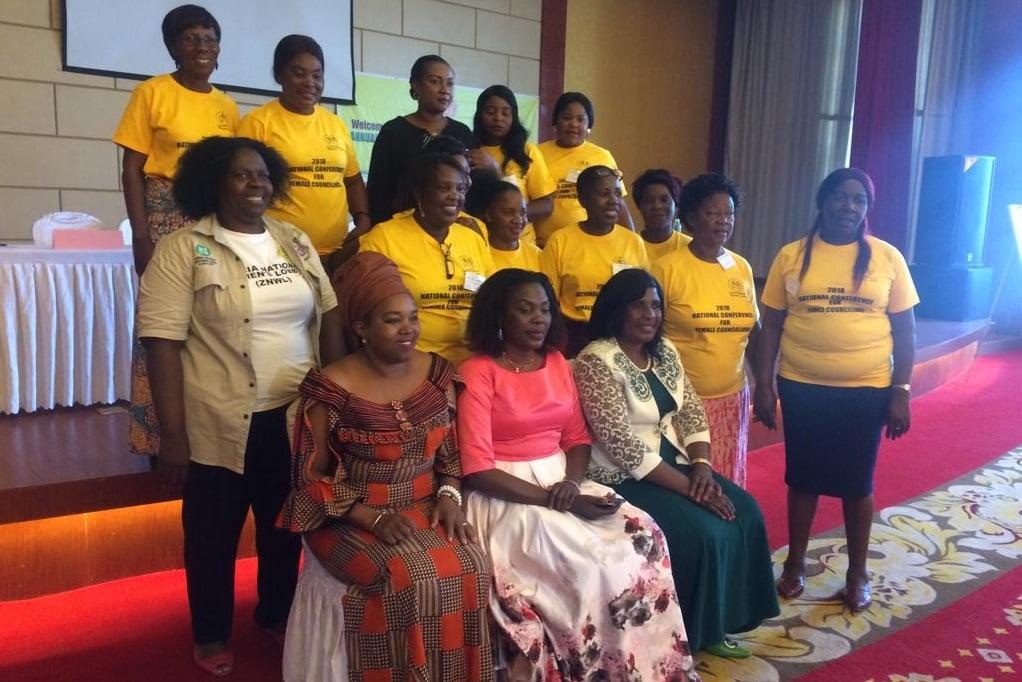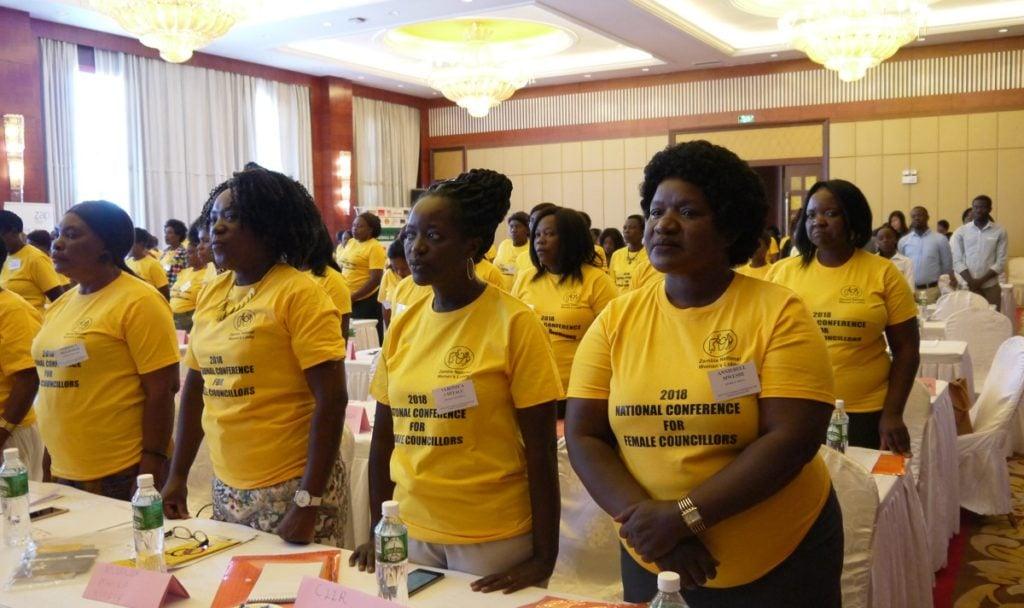A recent master’s thesis from Tampere University examines women’s political participation in Zambia. According to the study, the main factors that hinder women’s political participation are patriarchal attitudes, and low income and education levels. However, more supporting attitudes are emerging.
Social Anthropology student Karoliina Paakkinen’s thesis Gender in Zambian Politics – Zambian Female Politicians’ Experiences about their Possibilities to Participate in Decision-Making Processes is based on interviews of Zambian female councillors and on ethnographical findings. Paakkinen participated, for example, in the activities of Demo Finland’s and Zambia National Women’s Lobby’s (ZNWL) joint project, such as a conference of female councillors in Lusaka. Before starting her master’s thesis, Paakkinen worked as intern at Demo Finland, which increased her interest in the topic of gender in politics. The data for the thesis was collected in October–November 2018.
The research question of the thesis is “What is the significance of gender in Zambian politics?”, and this was examined by focusing on how the attitudes towards women’s political participation are and what resources affect their political participation. The study focuses on local level and specifically on the experiences of female councillors. In Zambia, women are very underrepresented in politics, since only 17 % of MPs and 9 % of councillors are women. Demo Finland and its partner organisation ZNWL have enhanced the role of women in local decision making since 2013 by offering trainings to female politicians and supporting their networking.
The main findings of the thesis are that gender is very significant in Zambian politics, but it can have both negative and positive influence depending on the context. Gender plays a crucial role especially in the beginning of female politician’s career, but later on the significance of gender decreases. Although patriarchal views on traditional gender roles are still a reality and restrict women’s participation in politics, attitudes are changing. Lack of resources can also create concrete obstacles to political participation.
Attitudes that hinder participation are changing gradually
Views that define politics as men’s job are not only a Zambian problem. Everywhere in the world women’s capacity as politicians and leaders have been questioned and gendered division of labour has brought women a bigger responsibility on household duties which decreases the time they can spend for other activities, such as politics. As such, it is not surprising that these patriarchal attitudes came up also in the interviews of Zambian female councillors. General atmosphere and culture where women are not seen as capable for politics were mentioned as obstacles to women’s political participation. Both men and women may have negative attitudes, but men’s attitudes were mentioned more often as factors that hinder women’s activity. Many female politicians have first got support from other women, who have then convinced men to become supporters too.
Women have encountered resistance to their political career especially in the beginning. For example, their families may have thought that politics is too violent and therefore opposed woman’s political activity. However, the attitudes have become more supportive later on. In addition to gender, age is also an important factor because especially young female politicians are often underrated by their families and other politicians. Fear can also prevent women from participating in politics. Several interviewees talked about harsh language, name-calling and intimidation aimed at female politicians. According to them, some people also search disgraceful things from female politcians’ past and use those against them to shy them away from decision making. This, one interviewee told, does not happen to men.
Attitudes also affect gendered division of labour that, according to the interviews, starts very young. When girls must help their families at home after school, boys can often use their time for other things. Many people also think that women can not have time for politics because they must do housework. Research shows indeed that women do most of the housework and bear main responsibility of childcare, and Zambia is not an exception.
On the other hand, some of the interviewees also mentioned their gender as an advantage, because there are voters who want to vote for a woman. Some councillors have got support specifically because they are women. According to them, some people think that female councillors are more reliable and more accountable to their voters than men. Many political actors, such as MPs and the President have also supported women’s participation. In one council, the councillors had insisted on having a female vice-chair as the chair was a man. The interviews showed that there are changes in the attitudes towards women’s political participation and traditional gender roles do not restrict women’s participation in politics as much as before. Female politicians are also supported.
Several interviewees feel that it is easier for men to advance into different positions. However, they are also very determined about their careers. Many of them have dreamed about becoming council chairpersons, MPs or even president. In order to reach their goals, they told they are working hard now so that they can convince their constituencies.

Resources are needed in politics
In addition to attitudes, more concrete factors also restrict the political participation of women. Money and education are resources that are needed in political career and that men often have more than women. Money is needed for electoral campaigning, candidate fees, helping the community and of course for living as politics takes up much of the time that one could otherwise spend earning money. Councillors get allowances, but according to many of the interviewees, the amount of the allowances is not sufficient. Councillor’s job is officially part-time, but in practice it is full-time, told the interviewees.
The diverse role of councillors came up in the interviews. In addition to their actual work in the council, councillors are expected to help their communities in many private issues. The councillors told, for example, that they have paid other community members’ funeral costs, transportation costs to the hospital and children’s school fees, and that they sometimes function as facilitators or mediators in their communities. People ask for their help both by telephone and by visiting their homes. The councillors are very much present in the everyday lives of their communities, especially when it comes to female councillors. Having close relationship with the community also has positive sides, said many of the interviewees, as the political parties listen to the councillors carefully. They are known to be experts of the issues of the communities.
Becoming a candidate is also not free of charge. The candidates must pay a fee that was raised before the 2016 general elections. The fees ranged from 75 dollars to as high as 750 dollars for parliamentary candidates. Campaigning also costs money as candidates must travel around the electorate to meet voters, and they are also expected to offer resfreshments in the campaign events. People wish to profit from the councillors in other ways as well than their political work.
Some women told that they have got financial support for example from their husband or neighbors. According to statistics, women’s incomes are lower than men’s in Zambia, and men are more likely to have a paid job. This means that women, on average, have less financial resources than men. According to the interviewees, women spend a bigger share of their money for their families than men. Research has also observed the same phenomenon. These factors place women in a weaker position than men when it comes to how much financial resources they can invest in their political career.
In addition to financial resources, education may also play a crucial role. Before the 2016 elections, an amendment to the constitution ruled that all candidates must have studied for 12 years and prove this with a Grade 12 certificate. In Zambia, the school drop-out of girls especially in rural areas is common and boys are more likely to complete secondary education than girls. This means that the requirement for the Grade 12 certificate hinders especially women’s candidacy. As Paakkinen interviewed women who had already been elected, lack of the certificate was not an obstacle for them. However, in some interviews the challenges concerning the education level were mentioned as a factor that concerns other potential candidates. One councillor also mentioned that there is corruption as certificates have been bought.
Paakkinen estimates that lack of resources hinders women’s political participation even more than negative attitudes, because change is already happening in how people think about female politicians. Lack of resources is also an obstacle that affects throughout political career, unlike attitudes that seem to become more supportive after the beginning.
Joint project of Demo Finland and ZNWL supports female politicians
The importance of capacity building and mentoring was mentioned in the interviews. Although the law in Zambia guarantees men and women equal rights concerning political participation, women face more obstacles. This is why supporting women’s participation in different ways is crucial. One councillor brought up gender quotas as a means to make the situaton more even for women. The project of Demo Finland and ZNWL focuses on offering trainings for female politicians and on supporting the cross-party cooperation of women. In the trainings, women are able learn skills that are essential in politics. These skills and the support from the project were highly valued in the interviews.
After the 2016 elections, there has been political tension in Zambia, and even electoral violence has occurred at by-elections. Paakkinen also observed some tension between female representatives of different parties. As the tense situation affects female politicians as well, there is a need for support to cooperation across party lines. Female politicians from different parties are committed to cooperation in Demo Finland’s and ZNWL’s project, and the women’s wings of the parties have founded a national dialogue forum and local cooperation forums where cross-party dialogue can be maintained.
Paakkinen examined the factors that affect women’s political participation based on the personal experiences of councillors. Based on her thesis, she also has visions on how the participation of women in Zambian politics could be strengthened. As three most important ways she mentions training and peer support for women, awareness raising on the benefits of the equal participation of women, and investing in girls’ education. ”Long-term work is needed as these kind of changes take much time”, she says.
The project of Demo Finland and ZNWL already aims at the general elections in 2021. Both female councillors and women who are interested in becoming candidates are supported. We are looking forward to see the amount of women in the local councils to increase next year!
Read more about our work in Zambia here.

